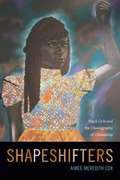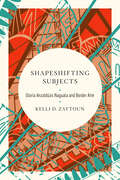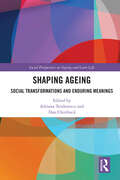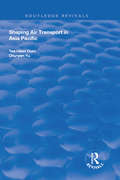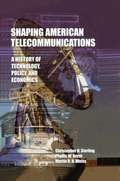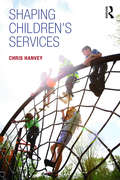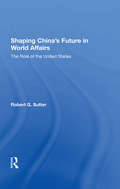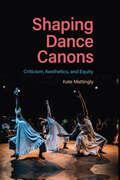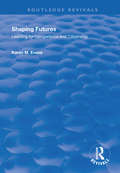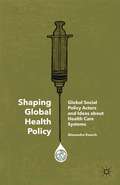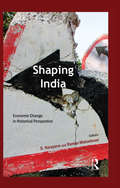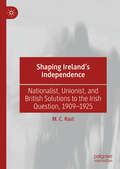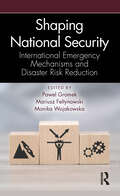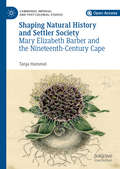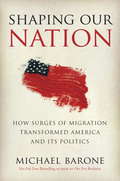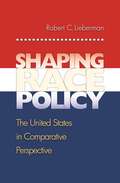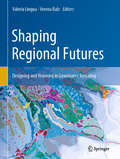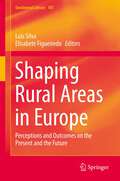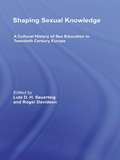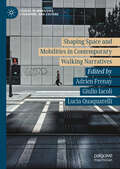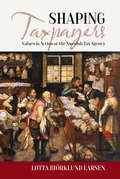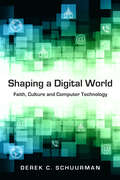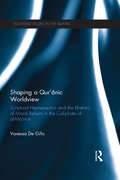- Table View
- List View
Shapeshifters: Black Girls and the Choreography of Citizenship
by Aimee Meredith CoxIn Shapeshifters Aimee Meredith Cox explores how young Black women in a Detroit homeless shelter contest stereotypes, critique their status as partial citizens, and negotiate poverty, racism, and gender violence to create and imagine lives for themselves. Based on eight years of fieldwork at a local shelter for women and girls, Cox shows how the shelter's residents--who range in age from fifteen to twenty-two--employ strategic methods she characterizes as choreography to disrupt the social hierarchies and prescriptive narratives that work to marginalize them. Among these are dance and poetry, which residents learn in shelter workshops. These outlets for performance and self-expression, Cox shows, are key to the residents exercising their agency, while their creation of alternative family structures demands a rethinking of notions of care, protection, and love. Cox also uses these young women's experiences to tell larger stories of Detroit's history, the Great Migration, deindustrialization, the politics of respectability, and the construction of Black girls and women as social problems. With Shapeshifters Cox gives a voice to young Black women who find creative and non-normative solutions to the problems that come with being young, Black, and female in America.
Shapeshifting Subjects: Gloria Anzaldua's Naguala and Border Arte (Transformations: Womanist studies)
by Kelli D. ZaytounKelli D. Zaytoun draws on Gloria Anzaldúa's thought to present a radically inclusive and expansive approach to selfhood, creativity, scholarship, healing, coalition-building, and activism. Zaytoun focuses on Anzaldúa's naguala/ shapeshifter, a concept of nagualismo. This groundbreaking theory of subjectivity details a dynamic relationship between “inner work” and "public acts" that strengthens individuals' roles in social and transformative justice work. Zaytoun's detailed emphasis on la naguala, and Nahua metaphysics specifically, brings much needed attention to Anzaldúa's long-overlooked contribution to the study of subjectivity. The result is a women and queer of color, feminist-focused work aimed at scholars in many disciplines and intended to overcome barriers separating the academy from everyday life and community. An original and moving analysis, Shapeshifting Subjects draws on unpublished archival material to apply Anzaldúa's ideas to new areas of thought and action.
Shaping Ageing: Social Transformations and Enduring Meanings (Social Perspectives on Ageing and Later Life)
by Adriana Teodorescu Dan ChiribucăThis volume examines the manifold, often contradictory, aspects of ageing, considering the ways in which contemporary social transformations affect the experience, conception, interpretation, and representation of ageing. Thematically arranged, it brings together the latest scholarly work from around the world to consider theories and narratives of ageing and the effects of space and place on identity and the experience of old age. Combining micro and macro perspectives, as well as theoretical and applied research, this interdisciplinary volume offers cross-cultural and comparative studies that resist overgeneralization and reductivism in an effort to shed fresh light on our experience, understanding, and response to ageing in the modern world. As such, it will appeal to scholars across the social sciences, particularly sociology, gerontology, demography, social policy, and cultural studies, with interests in ageing and later life.
Shaping Air Transport in Asia Pacific
by Tae Hoon Oum Chunyan YuThis title was first published in 2000: A comprehensive assessment of the markets and outlook for the air transport industry in the Asia-Pacific region. The book examines options for improvement of the regulatory system and industry structure, drawing on experience within and outside of the region. It includes the short- and long-term effects of the current economic crisis on Asian airlines and air transport markets and differs from other works due to its description and analysis of all major aspects of the Asian air transport industry and airlines.
Shaping American Telecommunications: A History of Technology, Policy, and Economics (LEA Telecommunications Series)
by Christopher H. Sterling Phyllis W. Bernt Martin B.H. WeissShaping American Telecommunications examines the technical, regulatory, and economic forces that have shaped the development of American telecommunications services. This volume is both an introduction to the basic technical, economic, and regulatory principles underlying telecommunications, and a detailed account of major events that have marked development of the sector in the United States. Beginning with the introduction of the telegraph and continuing through to current developments in wireless and online services, authors Christopher H. Sterling, Phyllis W. Bernt, and Martin B.H. Weiss explain each stage of telecommunications development, examining the interplay among technical innovation, policy decisions, and regulatory developments.Offering an integrated treatment of the interplay among technology, policy, and economics as key factors defining the development of the telecommunications sector in the United States, this volume also provides:*background material to facilitate understanding of each sector;*contexts for many so-called "new" issues, problems, and trends, demonstrating origins from years or decades in the past; and*careful annotation, documentation, and reference tables to enable further research on the topics discussed.This unique multidisciplinary approach provides a balanced view of U.S. telecommunications history, in context with relevant economic, legal, social, and technical analyses. As such, it is essential reading for advanced students in telecommunications needing to understand how the telecommunications industry and service developed to its current form. The volume will also serve as a supplemental text in courses on telecommunications regulation, and it will be of value to professionals in the field seeking context and background for their daily work.
Shaping Children's Services
by Chris HanveyThis text is an authoritative analysis of current services for children and young people in the UK. Drawing upon European-wide data, this innovative book critiques the policies that have shaped today’s services, argues that the current system is insufficiently joined-up and outlines a radical new model of co-located services for the integrated delivery of children’s care. Shaping Children’s Services: examines key indicators of children’s development; provides a breakdown of the economics of caring for children; explores the way government initiatives such as Sure Start, Extended Schools, Total Place and the Kennedy review of children’s health have shaped current policies; charts the key twentieth-century developments of child welfare across health, education and social care and looks at the inter-relationships between health, social care, police, education and the voluntary sector; presents both good and failing examples of children’s services. Offering a thoughtful and provocative challenge on how the present system can be better configured to meet the needs of children and young people, this book is an essential read for all those involved in working with children from a range of fields, including health, education, social care, juvenile justice and voluntary sector services.
Shaping China's Future In World Affairs: The Role Of The United States
by Robert G SutterThis book considers Chinese foreign policy and China's future role in world affairs in the context of the country's recent past. Robert Sutter shows that although it appears to be in U.S. interests for post-Mao leaders to continue moving toward international norms, a post-Deng leadership backed by growing economic and military power and reflecting profound changes in China's economy and society could move in markedly different directions. Most foreign powers appear willing to accommodate China, avoiding actions that could prompt a sharp shift in Chinese foreign policy, but Sutter argues that current U.S. policy intrudes on so many issues that are particularly sensitive for Beijing and for China's future that it represents perhaps the most critical variable determining how China will position itself in world affairs. Concluding that there is no guarantee the United States will use this influence wisely, Sutter examines the uncertainty and unpredictability of U.S. foreign policy in the post-Cold War environment that work against the creation of an effective U.S. policy toward China.
Shaping Dance Canons: Criticism, Aesthetics, and Equity
by Kate MattinglyExamining a century of dance criticism in the United States and its influence on aesthetics and inclusion Dance criticism has long been integral to dance as an art form, serving as documentation and validation of dance performances, yet few studies have taken a close look at the impact of key critics and approaches to criticism over time. The first book to examine dance criticism in the United States across 100 years, from the late 1920s to the early twenty-first century, Shaping Dance Canons argues that critics in the popular press have influenced how dance has been defined and valued, as well as which artists and dance forms have been taken most seriously. Kate Mattingly likens the effect of dance writing to that of a flashlight, illuminating certain aesthetics at the expense of others. Mattingly shows how criticism can preserve and reproduce criteria for what qualifies as high art through generations of writers and in dance history courses, textbooks, and curricular design. She examines the gatekeeping role of prominent critics such as John Martin and Yvonne Rainer while highlighting the often-overlooked perspectives of writers from minoritized backgrounds and dance traditions. The book also includes an analysis of digital platforms and current dance projects—On the Boards TV, thINKingDANCE, Black Dance Stories, and amara tabor-smith’s House/Full of BlackWomen—that challenge systemic exclusions. In doing so, the book calls for ongoing dialogue and action to make dance criticism more equitable and inclusive.
Shaping Futures: Learning for Competence and Citizenship (Routledge Revivals)
by Karen M. EvansFirst published in 1998, this volume draws on studies of real-life experiences in the status passage to adulthood and argues that policies must be based on more holistic analyses of social dynamics. Karen M. Evans recognises that the time taken to reach adult status has lengthened in all the industrialised countries. At the same time, the risks for young people trying to 'make their way' have increased. How are they experiencing the new circumstances? What kinds of preparation and support do they need to become full citizens? What roles should education, training, work and the community have in providing this? As well as providing learning support, they must include measures which help to change the social and material conditions which stretch many young people beyond their capacities to cope unaided and which can defeat and ultimately exclude.
Shaping Global Health Policy: Global Social Policy Actors and Ideas about Health Care Systems
by Alexandra KaaschUsing an approach that combines transnational and comparative social policy analysis with international relations, this book assesses various global social policy actors and compares their ideas and prescriptions about national health care systems. It highlights the importance of considering health policies across multiple scales.
Shaping Immigration News
by Rodney BensonThis book offers a comprehensive portrait of French and American journalists in action as they grapple with how to report and comment on one of the most important issues of our era. Drawing on interviews with leading journalists and analyses of an extensive sample of newspaper and television coverage since the early 1970s, Rodney Benson shows how the immigration debate has become increasingly focused on the dramatic, emotion-laden frames of humanitarianism and public order. In both countries, less commercialized media tend to offer the most in-depth, multi-perspective and critical news. Benson challenges classic liberalism's assumptions about state intervention's chilling effects on the press, suggests costs as well as benefits to the current vogue in personalized narrative news, and calls attention to journalistic practices that can help empower civil society. This book offers new theories and methods for sociologists and media scholars and fresh insights for journalists, policy makers and concerned citizens.
Shaping India: Economic Change in Historical Perspective
by D. Narayana; Raman MahadevanThis volume seeks to unravel and contextualize the so-called dichotomy of ‘old’ and ‘new’ India and what binds them together. To understand this complex process, it attempts to apply a long-term historical perspective, a different conception of the economy and cross-disciplinary approaches. The exceptional feature of this volume is the large historical canvas of essays and its sensitivity to the regional dimension in a country as large and diverse as India. They deal with issues ranging from land and agriculture, entrepreneurship, industry and demographic trends to a critical anatomy of modern Indian economic historiography. Together these essays contribute in providing significantly new and enriching insights into the complex process of transition from colonial to post-colonial economic development. There has been a conscious effort in most cases to capture the influence of the colonial economic structures and processes in shaping the trajectory of growth and development in the post-independence period. Drawing upon a large amount of extremely rich and varied data and information on the socio-economic trends, the book is lucid, well-crafted and reader-friendly.
Shaping Ireland’s Independence: Nationalist, Unionist, and British Solutions to the Irish Question, 1909–1925
by M. C. RastThis book explores the political and ideological developments that resulted in the establishment of two separate states on the island of Ireland: the Irish Free State and Northern Ireland. It examines how this radical transformation took place, including how British Liberals and Unionists were as influential in the “two-state solution” as any Irish party. The book analyzes transformative events including the third home rule crisis, partition and the creation of Northern Ireland, and the Irish Free State’s establishment through the Anglo-Irish Treaty. The policies and priorities of major figures such as H.H. Asquith, David Lloyd George, John Redmond, Eamon de Valera, Edward Carson, and James Craig receive prominent attention, as do lesser-known events and organizations like the Irish Convention and Irish Dominion League. The work outlines many possible solutions to Britain’s “Irish question,” and discusses why some settlement ideas were adopted and others discarded. Analyzing public discourse and archival sources, this monograph offers new perspectives on the Irish Revolution, highlighting in particular the tension between public rhetoric and private opinion.
Shaping National Security: International Emergency Mechanisms and Disaster Risk Reduction
by Pawel Gromek Mariusz Feltynowski Monika WojakowskaShaping National Security: International Emergency Mechanisms and Disaster Risk Reduction presents international emergency mechanisms relative to disaster risk reduction (DRR). The goal is to share knowledge about existing frameworks, and utilize established DRR policies and programs, as another means to reinforce and strengthen national security in countries around the world. The book outlines, in detail, the United Nations Disaster Assessment and Coordination (UNDAC), the International Search and Rescue Advisory Group (INSARAG), the North Atlantic Treaty Organisation (NATO) and the Union Civil Protection Mechanism (UCPM) DRR programs. While these entities’ versions of DRR best practices are largely directed at decreasing the impact of disaster hazards, limiting relevant exposure, local vulnerabilities, increasing capacities to cope with disaster, the authors present these frameworks as potential tools, and effective means, to support national security efforts. This is especially important in disaster circumstances when local, and national emergency resources, may be insufficient to face hazards and multi-hazards, and result in cascading effects to occur as hazard events transpire. Chapters present various resources available to them, through these programs, to encourage authorities from every country to effectively apply the mechanisms—and emergency mechanisms specifically—to offer domestic solutions. Due to these programs proven track records in providing organisational standards, the use of such mechanisms can serve as both the basis to foster sound DRR practices and, by extension, can supplement resiliency, security, and continuity within countries. This concept is based on the premise that the UNDAC, INSARAG, NATO and ECPM emergency mechanisms have been developed to be implementable (directly or indirectly) in every country in the world when disasters occur. Shaping National Security takes a "big-picture," holistic view of DRR and national security to offer innovative ideas and solutions to professionals and officials working in disaster management, disaster risk reduction, emergency management, crisis management, civil protection, public security management, national security, criminal justice, international studies, and homeland security.
Shaping Natural History and Settler Society: Mary Elizabeth Barber and the Nineteenth-Century Cape (Cambridge Imperial and Post-Colonial Studies Series)
by Tanja HammelThis book explores the life and work of Mary Elizabeth Barber, a British-born settler scientist who lived in the Cape during the nineteenth century. It provides a lens into a range of subjects within the history of knowledge and science, gender and social history, postcolonial, critical heritage and archival studies. The book examines the international importance of the life and works of a marginalized scientist, the instrumentalisation of science to settlers' political concerns and reveals the pivotal but largely silenced contribution of indigenous African experts. Including a variety of material, visual and textual sources, this study explores how these artefacts are archived and displayed in museums and critically analyses their content and silences. The book traces Barber’s legacy across three continents in collections and archives, offering insights into the politics of memory and history-making. At the same time, it forges a nuanced argument, incorporating study of the North and South, the history of science and social history, and the past and the present.
Shaping Online News Performance: Political News in Six Western Democracies (Challenges to Democracy in the 21st Century)
by Edda HumprechtShaping Online News Performance.
Shaping Our Nation
by Michael BaroneIt is often said that America has become culturally diverse only in the past quarter century. But from the country's beginning, cultural variety and conflict have been a centrifugal force in American politics and a crucial reason for our rise to power. The peopling of the United States is one of the most important stories of the last five hundred years, and in Shaping our Nation, bestselling author and demographics expert Michael Barone illuminates a new angle on America's rise, using a vast array of political and social data to show America is the product of a series large, unexpected mass movements--both internal and external--which typically lasted only one or two generations but in that time reshaped the nation, and created lasting tensions that were difficult to resolve. Barone highlights the surprising trends and connections between the America of today and its migrant past, such as how the areas of major Scots-Irish settlement in the years leading up to the Revolutionary War are the same areas where John McCain performed better in the 2008 election than George W. Bush did in 2004, and how in the years following the Civil War, migration across the Mason-Dixon line all but ceased until the annealing effect that the shared struggle of World War II produced. Barone also takes us all the way up to present day, showing what the surge of Hispanic migration between 1970 and 2010 means for the elections and political decisions to be made in the coming decades. Barone shows how, from the Scots-Irish influxes of the 18th century, to the Ellis Island migrations of the early 20th and the Hispanic and Asian ones of the last four decades, people have moved to America in part in order to make a better living--but more importantly, to create new communities in which they could thrive and live as they wanted. And the founders' formula of limited government, civic equality, and tolerance of religious and cultural diversity has provided a ready and useful template for not only to coping with these new cultural influences, but for prospering as a nation with cultural variety. Sweeping, thought-provoking, and ultimately hopeful, Shaping Our Nation is an unprecedented addition to our understanding of America's cultural past, with deep implications for the immigration, economic, and social policies of the future. From the Hardcover edition.
Shaping Race Policy: The United States in Comparative Perspective (Princeton Studies in American Politics: Historical, International, and Comparative Perspectives #93)
by Robert LiebermanShaping Race Policy investigates one of the most serious policy challenges facing the United States today: the stubborn persistence of racial inequality in the post-civil rights era. Unlike other books on the topic, it is comparative, examining American developments alongside parallel histories of race policy in Great Britain and France. Focusing on on two key policy areas, welfare and employment, the book asks why America has had such uneven success at incorporating African Americans and other minorities into the full benefits of citizenship. Robert Lieberman explores the historical roots of racial incorporation in these policy areas over the course of the twentieth century and explains both the relative success of antidiscrimination policy and the failure of the American welfare state to address racial inequality. He chronicles the rise and resilience of affirmative action, including commentary on the recent University of Michigan affirmative action cases decided by the Supreme Court. He also shows how nominally color-blind policies can have racially biased effects, and challenges the common wisdom that color-blind policies are morally and politically superior and that race-conscious policies are merely second best. Shaping Race Policy has two innovative features that distinguish it from other works in the area. First, it is comparative, examining American developments alongside parallel histories of race policy in Great Britain and France. Second, its argument merges ideas and institutions, which are usually considered separate and competing factors, into a comprehensive and integrated explanatory approach. The book highlights the importance of two factors--America's distinctive political institutions and the characteristic American tension between race consciousness and color blindness--in accounting for the curious pattern of success and failure in American race policy.
Shaping Regional Futures: Designing and Visioning in Governance Rescaling
by Valeria Lingua Verena BalzThis book discusses the role of regional design and visioning in the formation of regional territorial governance to offer a better understanding of (1) how a recognition of spatial dynamics and the visualization of spatial futures informs, and is informed by, planning frameworks and (2) how such design processes inform co-operation and collaboration on planning in metropolitan regions. It gathers theoretical reflections on these topics, and illustrates them by means of practical experiences in several European countries. Innovatively associating ideas with knowledge, it appeals to anyone with an interest in planning experiments in a post-regulative era. It aims at an increased understanding of how practices, engaged with the imagination of possible futures, support the creation of institutional capacity for strategic spatial planning at regional scales.
Shaping Rural Areas in Europe
by Luís Silva Elisabete FigueiredoShaping Rural Areas in Europe. Perceptions and Outcomes on the Present and the Future sets out to investigate the effect of urban perceptions about the rural and consequent demands on rurality on the present and future configurations of rural territories in Europe in the early twenty-first century. This volume presents and discusses a broad range of case studies and theoretical and methodological approaches from different academic fields, mainly Anthropology, Sociology and Geography.
Shaping Sexual Knowledge: A Cultural History of Sex Education in Twentieth Century Europe (Routledge Studies in the Social History of Medicine)
by Roger Davidson Lutz SauerteigThe history of sex education enables us to gain valuable insights into the cultural constructions of what different societies have defined as 'normal' sexuality and sexual health. Yet, the history of sex education has only recently attracted the full attention of historians of modern sexuality. Shaping Sexual Knowledge: A Cultural History of Sex Education in Twentieth Century Europe makes a considerable contribution not only to the cultural history of sexual enlightenment and identity in modern Europe, but also to the history of childhood and adolescence. The essays collected in this volume treat sex education in the broadest sense, incorporating all aspects of the formal and informal shaping of sexual knowledge and awareness of the young. The volume, therefore, not only addresses officially-sanctioned and regulated sex education delivered within the school system and regulated by the State and in some cases the Church, but also the content, iconography and experience of sexual enlightenment within the private sphere of the family and as portrayed through the media.
Shaping Space and Mobilities in Contemporary Walking Narratives (Studies in Mobilities, Literature, and Culture)
by Adrien Frenay Giulio Iacoli Lucia QuaquarelliShaping Space and Mobilities in Contemporary Walking Narratives represents an exploration of the dynamic intersections between mobility, space, and literature. By focusing on walking as both a practice and a narrative device, the book illustrates how mobilities shape and reconfigure our experiences of space. Drawing from both literary and interdisciplinary approaches, the contributors engage with diverse themes, including urban flânerie, rural wanderings, migration, and queer spatialities. The research presented here shows how literary discourse mediates and constructs human relationships with space and place. Addressing with key theoretical movements such as the narrative, spatial, and mobilities turns, this book contributes to the recent humanities turn by advancing discussions within mobility studies, particularly in French and Italian contexts.
Shaping Taxpayers: Values in Action at the Swedish Tax Agency
by Lotta Björklund LarsenHow do you make taxpayers comply? This ethnography offers a vivid, yet nuanced account of knowledge making at one of Sweden's most esteemed bureaucracies – the Swedish Tax Agency. In its aim to collect taxes and minimize tax faults, the Agency mediates the application of tax law to ensure compliance and maintain legitimacy in society. This volume follows one risk assessment project's passage through the Agency, from its inception, through the research phase, in discussions with management to its final abandonment. With its fiscal anthropological approach, Shaping Taxpayers reveals how diverse knowledge claims – legal, economic, cultural – compete to shape taxpayer behaviour.
Shaping a Digital World: Faith, Culture and Computer Technology
by Derek C. SchuurmanDigital technology has become a ubiquitous feature of modern life. Our increasingly fast-paced world seems more and more remote from the world narrated in Scripture. But despite its pervasiveness, there remains a dearth of theological reflection about computer technology and what it means to live as a faithful Christian in a digitally-saturated society. In this thoughtful and timely book, Derek Schuurman provides a brief theology of technology, rooted in the Reformed tradition and oriented around the grand themes of creation, fall, redemption and new creation. He combines a concise, accessible style with penetrating cultural and theological analysis. Building on the work of Jacques Ellul, Marshall McLuhan and Neil Postman, and drawing from a wide range of Reformed thinkers, Schuurman situates computer technology within the big picture of the biblical story. Technology is not neutral, but neither is there an exclusively "Christian" form of technological production and use. Instead, Schuurman guides us to see the digital world as part of God?s good creation, fallen yet redeemable according to the law of God. Responsibly used, technology can become an integral part of God?s shalom for the earth.
Shaping a Qur'anic Worldview: Scriptural Hermeneutics and the Rhetoric of Moral Reform in the Caliphate of al-Ma'ūn (Routledge Studies in the Qur'an)
by Vanessa De GifisExploring the subjectivity of the Qurʾān’s meaning in the world, this book analyses Qurʾānic referencing in Muslim political rhetoric. Informed by classical Arabic-Islamic rhetorical theory, the author examines Arabic documents attributed to the ʿAbbāsid Caliph al-Maʾmūn (r. 813-833), whose rule coincided with the maturation of classical Islamic political thought and literary culture. She demonstrates how Qurʾānic referencing functions as tropological exegesis, whereby verses in the Qurʾān are reinterpreted through the lens of subjective experience. At the same time socio-historical experiences are understood in terms of the Qurʾān’s moral typology, which consists of interrelated polarities that define good and bad moral characters in mutual orientation. Through strategic deployment of scriptural references within the logical scheme of rhetorical argument, the Caliph constructs moral analogies between paradigmatic characters in the Qurʾān and people in his social milieu, and situates himself as moral reformer and guide, in order to persuade his audiences of the necessity of the Caliphate and the religio-moral imperative of obedience to his authority. The Maʾmūnid case study is indicative of the nature and function of Qurʾānic referencing across historical periods, and thus contributes to broader conversations about the impact of the Qurʾān on the shaping of Islamic civilization. This book is an invaluable resource for those with an interest in Early Islamic History, Islam and the rhetoric of contemporary Middle East regional and global Islamic politics.
